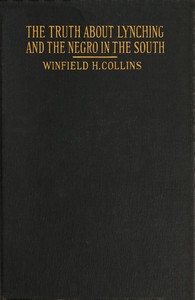The Truth About Lynching and the Negro in the South by Winfield H. Collins
"The Truth About Lynching and the Negro in the South" by Winfield H. Collins is a historical account written in the early 20th century. The text confronts the issues of lynching, particularly in the context of the Southern United States, and it aims to shed light on the circumstances surrounding the treatment of Black individuals during this tumultuous period. The book is driven by the author's perspective on race relations and the
complexities of justice and punishment in the post-Civil War South. At the start of the work, Collins provides a historical overview of lynching, noting its roots during the colonial period when it often involved punishment that was less severe than today's understanding. He details how the term evolved to mean extrajudicial killings, especially of Black individuals, and discusses various social factors contributing to the increase of lynching in the years leading up to the Civil War. The opening chapters indicate that Collins seeks to unravel myths about lynching and portray a narrative grounded in his views on race, social dynamics, and the perceived moral and criminal failings of the Black population during that time. His argument seems aimed at justifying the historical context of lynching within a broader socio-political discourse. (This is an automatically generated summary.)
Read or download for free
| How to read | Url | Size | |||
|---|---|---|---|---|---|
| Read now! | https://www.gutenberg.org/ebooks/67193.html.images | 313 kB | |||
| EPUB3 (E-readers incl. Send-to-Kindle) | https://www.gutenberg.org/ebooks/67193.epub3.images | 362 kB | |||
| EPUB (older E-readers) | https://www.gutenberg.org/ebooks/67193.epub.images | 360 kB | |||
| EPUB (no images, older E-readers) | https://www.gutenberg.org/ebooks/67193.epub.noimages | 163 kB | |||
| Kindle | https://www.gutenberg.org/ebooks/67193.kf8.images | 457 kB | |||
| older Kindles | https://www.gutenberg.org/ebooks/67193.kindle.images | 420 kB | |||
| Plain Text UTF-8 | https://www.gutenberg.org/ebooks/67193.txt.utf-8 | 224 kB | |||
| Download HTML (zip) | https://www.gutenberg.org/cache/epub/67193/pg67193-h.zip | 331 kB | |||
| There may be more files related to this item. | |||||
Similar Books
About this eBook
| Author | Collins, Winfield H. (Winfield Hazlitt), 1868-1927 |
|---|---|
| LoC No. | 18021663 |
| Title |
The Truth About Lynching and the Negro in the South In Which the Author Pleads That the South Be Made Safe for the White Race |
| Original Publication | United States: The Neale Publishing Co.,1918. |
| Note | Reading ease score: 66.4 (8th & 9th grade). Neither easy nor difficult to read. |
| Credits | Tim Lindell, Lisa Reigel, and the Online Distributed Proofreading Team at https://www.pgdp.net (This file was produced from images generously made available by The Internet Archive/American Libraries.) |
| Language | English |
| LoC Class | E151: History: America: United States |
| Subject | African Americans |
| Subject | Lynching |
| Subject | Southern States -- Race relations |
| Category | Text |
| EBook-No. | 67193 |
| Release Date | Jan 18, 2022 |
| Copyright Status | Public domain in the USA. |
| Downloads | 187 downloads in the last 30 days. |
| Project Gutenberg eBooks are always free! | |


